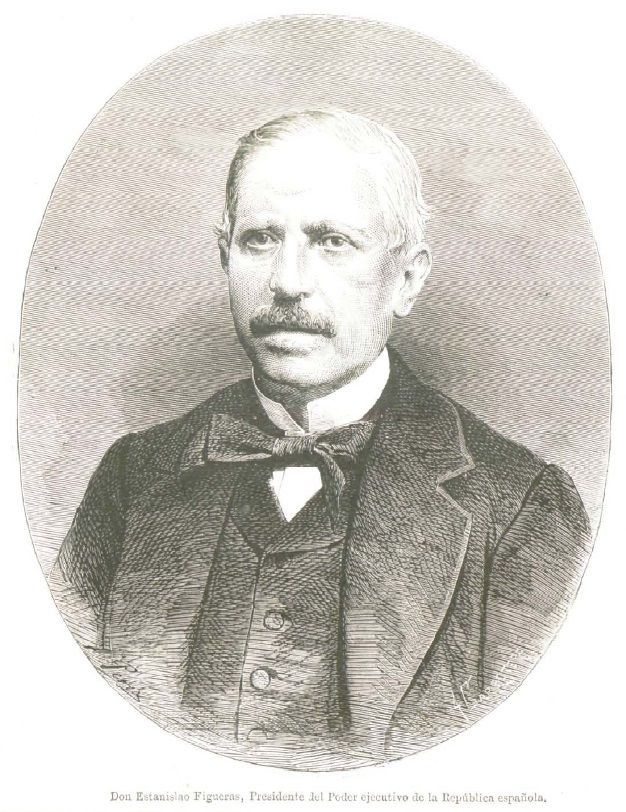- IT HAPPENEDPolitics
- 11 de November de 2024
- No Comment
- 6 minutes read
Estanislao Figueras y Moragas

IT HAPPENED…
On November 11, 1882
Estanislao Figueras y Moragas died in Madrid


On November 11, 1882, Estanislao Figueras y Moragas, a lawyer, politician and statesman, died in Madrid. He was the first president of the First Spanish Republic, between February 12 and June 11, 1873.
Figueras was born in Barcelona on November 13, 1819. After studying Law at the University of Barcelona, he moved to Tarragona in 1844 to join a prestigious law firm, which he later went on to direct in Madrid. He was a member of the Progressive Party from very young age, later being one of the leaders of the split that gave rise to the Democratic Party. He participated in the revolution of 1848 and was elected as deputy to the Parliament for Tarragona in 1850, being re-elected in successive elections. Under the Narváez government, he had to go into exile in Portugal in 1867, returning with the triumph of La Gloriosa in 1868, which overthrew queen Isabel II.
He was a man of great oratory ability and fluent writing, and he acquired a solid reputation as a lawyer, politician and journalist. After his return to Spain, he founded the newspaper ‘La Igualdad’ in Madrid, which became the unofficial organ of the federal republican party. He stood out in the debates on the form of state that Spain should adopt, being one of the 63 deputies who in 1869 voted in favour of the republican model. After the monarchy of Amadeo of Savoy was proclaimed, he continued to lead the republican group, being the point of concord between the federalist republicans of Pi y Margall and the supporters of the unitary republic, led by Castelar. Although he was a federalist himself, his positions were in line with those of Nicolás Salmerón, in the idea of a measured, progressive and balanced decentralisation, without great ruptures or fuss.
When King Amadeo de Saboya finally got tired and decided to leave, taking refuge in the Italian embassy, the Cortes voted to proclaim the Republic. Due to his prestige and because he was a point of balance, he was elected president of the Spanish Republic.
But the political panorama he found could not have been more discouraging. In addition to the political intrigues within and outside his own party, there was the armed uprising of the Carlists -always lurking-, an attempted coup d’état, insubordinations in the army and the evolution of the most radical federalism towards cantonalism. Despite this, modernising laws were approved and implemented. He dissolved the assembly and called the Constituent parliament, which were said to be the first unfalsified elections in the history of Spain. But the institutional crisis continued to erode the Republic…
It seems that everything started at a ministerial meeting, with the eternal squabbles between Castelar and Pi y Margall. At one point, Figueras got fed up and burst out: “Gentlemen, I’m going to be frank with you. I’m fed up with all of us.” Immediately afterwards, he got up and left the meeting room.
The next day, since he did not show up anymore, the ministers Castelar and Pi y Margall ordered to go to look for him at his home, thinking that perhaps he was feeling ill. The servants reported that the night before, the president had packed his bags and had ordered to be taken to the station for a train to France, leaving precise instructions that in case anyone had noticed his absence and had eventually come inquiring about his whereabouts he should be properly informed. He had just left.
Faced with this situation, Castelar and Pi y Margall met in a sanhedrin and arranged for the latter to take over the presidency. Figueras returned a few months later, to “save the Republic”, which was by then dying, with Castelar at the helm. But there was little left to be saved, and he’d not even recover his lost prestige. After the fall of the Republic, he distanced himself more and more from Pi y Margall, aligning himself with Ruiz Zorrilla and Salmerón. In 1880, during the Restoration, he founded the Organic Federal Republican Party with them. But Ruiz Zorrilla and Salmerón were exiled in France, and Figueras died the following year, so the new party did not have a future.
Without a doubt, his entire political career was marked by his panic and “flight” to France. An action that was perhaps not very gallant, but which left his phrase for history: “I’m fed up with ALL OF US.”
Source: educational EVIDENCE
Rights: Creative Commons

